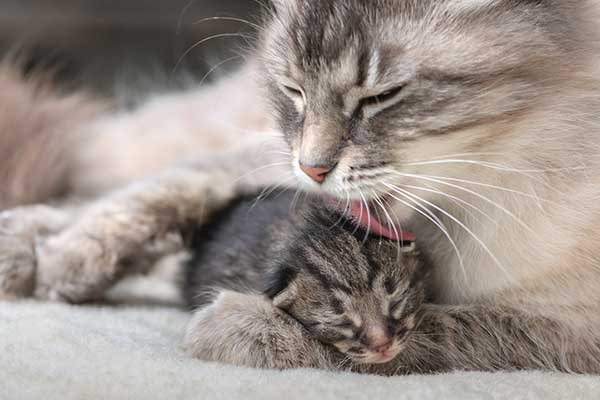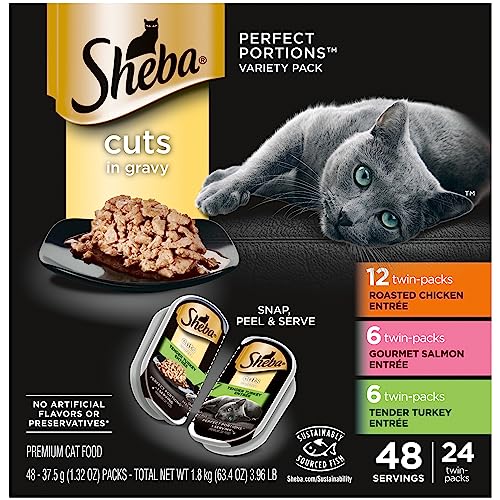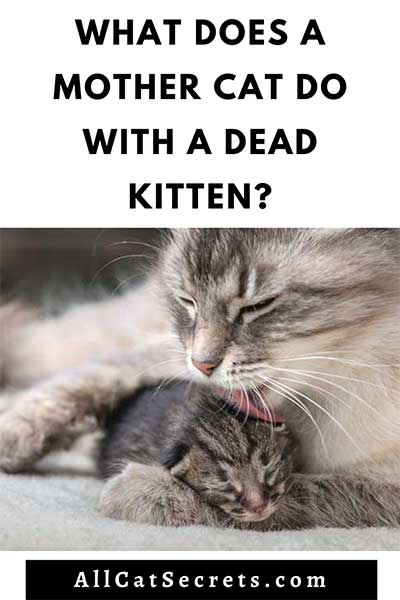The death of a loved one comes with profound grief. So far, humans hold the record for the species that grieves the loss of their loved ones the most.
But that doesn’t mean other animals simply go on with their lives in the face of a bereavement, and certainly not when the deceased happens to be their very own young.
While death generally comes with a deep sense of grief, despondency, and loneliness, different animals have their unique ways of grieving over the loss of their young ones. And cats are no exception.
Maybe you’ve always wondered, what does a mother cat do when a kitten dies?
Now, there are various ways a mother cat can respond to the death of her young. The cat may be overcome by her sense of affection for the motionless body of her young and start to lick it. The cat may also try to bury or hide the body of her dead kitten. More strangely, some cats are known to eat their dead kitten.
However way your cat reacts to the loss of her kittens, there’s a fundamental reason behind it.
But just why do cats grieve the loss of their young?
Like human beings, cats are highly protective of their young. That’s why before giving birth, you’ll realize that a mother cat tries to find a safe haven for her kittens.
A mother cat’s protective nature of her kittens is also the reason why the loss of her babies can leave her seriously traumatized and highly aggressive.
It’s not unusual for cats to lunge at anyone that tries to get too close to the dead body of their young. Even their human parents aren’t immune to this grief-induced aggression.
Read on as we expound further on how cats grieve the death of their kittens and the reasons behind their strange grieving behaviors.
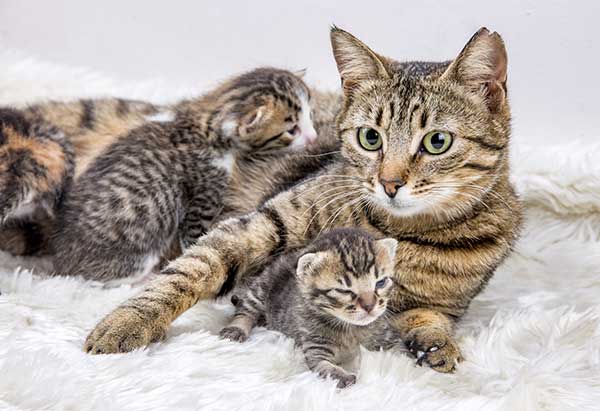
Various Ways Mother Cats Mourn the Death of Their Young
1. Licking the Dead Kitten
Mother cats, like all mothers in the world, are highly loving and affectionate of their young. That affection doesn’t die with the death of their kittens. Therefore, it comes as no surprise that licking the bodies of her motionless kitten is one of the ways a mother cat responds to the death of her young.
Licking is an instinctive behavior that the cat deploys to try and check if the kitten can move. Licking also helps to stimulate breathing, drain liquid from the kitten’s lungs, and remove any remaining placenta on the kitten.
However, after licking it for a few minutes with no response, the cat will now be convinced that the kitten is dead. Once the reality of her dead young sets in, the cat will stop licking her kitten and proceed to nurse her other babies.
2. Cleaning Up the Dead Kitten
This is a common phenomenon during stillbirths. If a mother cat realizes that her baby is stillborn, she may continue licking and grooming it even after realizing that the kitten is dead. Having watched all of her other kittens move, the cat just can’t believe that the other one is dead.
You may notice that the grooming is a bit rigorous, both to the live and dead kittens. The convention is not to interrupt the cat. Instead, give her some time to come to terms with her sad reality.
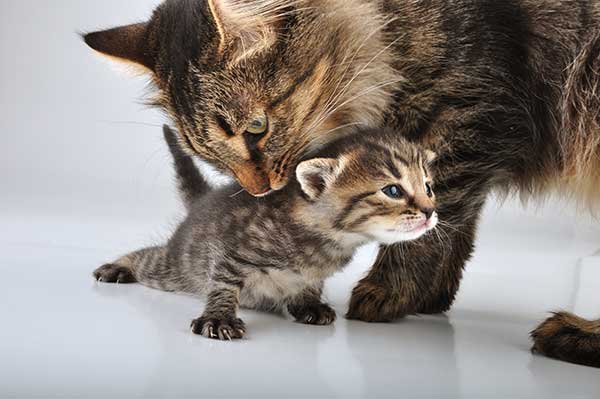
3. Hiding the Dead Kitten
Another way a mother cat may grieve the death of her kitten is by hiding its body. There are numerous places where a cat can hide the body of her dead kitten.
Some cats prefer to tuck the body inside a closet, whereas others may try to bury the kitten in the ground. Hiding the body of a dead kitten is a mother cat’s way of trying to make it undiscoverable by predators. It’s also a way to stop humans or other pets from getting too close to the body.
Most importantly, hiding or burying the body of the dead kitten allows a mother cat to get some closure. It lessens her grief and allows her to go back to nursing her other kittens.
4. Holding On To the Dead Kitten
Some mother cats will hide the bodies of their young to prevent them from being discovered by predators. However, other cats will hold on to their dead kitten by laying on their motionless bodies. It’s also their way of being protective.
Such cats may not even allow their human parents to get too close to the body of their dead kitten. As the cat’s owner, you shouldn’t interrupt her when she’s lying on the body of her dead young. Instead, offer the cat food elsewhere, or wait till she returns to her other kittens and then dispose of the body.
Whatever you do, ensure that your feline friend doesn’t catch you. Her maternal instincts may get the better of her and cause her to bite or scratch you.
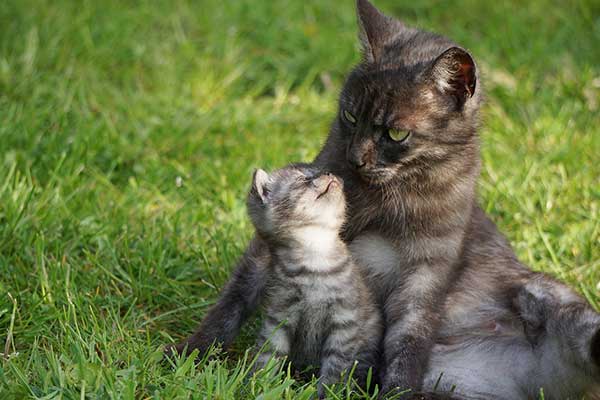
5. Bringing the Dead Kitten to Her Human Parent
Imagine your neighbor hauling the body of her dead child and dropping it at your doorstep. It doesn’t matter whether you’re suspicious or not, that can never be an ideal situation. But in the world of our feline friends, it’s perfectly normal for a cat to take the body of her dead young to her human owner.
One of the related questions concerning how cats grieve the loss of their young is, why did my cat bring me her dead kitten?
Now, there’s no cause for worry if a mother cat chooses to bring her kitten’s dead body to you. It’s actually the cat’s own way of expressing her love and trust for you. Having lived with you under the same roof for some time, the cat has since developed a sense of belonging. So, by bringing her dead young to you, the mother cat wants you to share in her grief.
It’s also worth noting that cats understand that they rank considerably lower than their human owners within the family pecking order. That might also help explain why some mother cats prefer to bring the bodies of their dead young to their human parents.
By virtue of your superior ranking in the family pecking order, your feline friend sincerely believes that you’re better placed to determine what to do with the body of her young. Remember, that’s what they typically do after hunting down an animal.
ALSO READ: Why Does My Cat Pee in the Sink? What Can I Do About It?
6. Eating the Dead Kitten
It may sound gross to humans, but there’s nothing gross about a cat eating the dead body of her kitten. After giving birth to their litter, cats tend to chew the umbilical cord of every kitten. The behavior is instrumental in helping to facilitate blood clot in the umbilical cords.
Once a mother cat has chewed the umbilical cords of her newborn kittens, she will usually lick the kittens in a bid to try and clean them up. If she spots a motionless member of the litter, the mother cat may just eat it up.
Most cats are known to eat just one or a few of their kittens. However, other cats can choose to gobble up the whole litter. Again, that doesn’t make your cat less of a mother and you shouldn’t begin to think that she has degenerated into a savage cannibal.
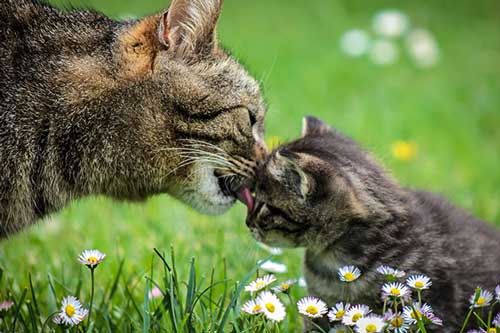
There are numerous reasons why a cat may eat her dead kitten;
✔ It’s a way of protecting her body from being discovered by predators or other external threats, such as older cats.
✔ The meat from her kitten provides nutrients that are dissolved in milk, which the other live kittens can benefit from. This usually happens when the cat is under-fed or malnourished.
✔ It’s a way of expressing mercy and sympathy for the kitten, especially if it’s stillborn or born with congenital defects. The cat doesn’t want her young to experience challenges growing, so she decides to devour her.
✔ It’s a way of bringing closure much faster.
7. Leaving the Dead Kitten
The death of one kitten is enough to plunge a mother cat into grief. However, the cat must soon decide between being consumed with grief and attending to her other live kittens.
On a long enough timeline, the mother cat will leave the dead body of her kitten to its own devices. In the case of feral cats, this decision is usually made sooner rather than later.
But even after abandoning the body of her dead kitten, the cat will still revisit the same spot where she lost her young from time to time. Even though she has moved on, it may take some time to get over the loss completely.
Last update on 2024-07-14 / Affiliate links / Images from Amazon Product Advertising API
How Do You Know That Your Cat Has Lost Her Young?
It may be difficult to establish outright that your mother cat has lost her young. That’s particularly if the cat went ahead to hide or eat the dead body of her kitten, which leaves you with no physical evidence to rely on.
However, there are certain tell-tale signs of a grieving cat. The onus is on you to check on your mother cat from time to time, especially immediately after birthing her kittens and within the first few weeks of nursing them. That’s the only way you can spot if anything is out of place.
The following are some of the signs of grief in a cat;
✔ Eating disorders, such as a loss of appetite or a voracious appetite.
✔ Gastrointestinal disorders, including nausea and vomiting, or diarrhea which leads to dehydration and abdominal pains.
✔ Bowel and/or bladder incontinence.
✔ Irritable behavior, such as searching around the house and excessive purring, yowling, or meowing.
✔ Changes in sleeping patterns, including sleeplessness or oversleeping.
✔ Personality changes. For instance, a cat that was once playful and hyperactive suddenly becomes withdrawn and aloof.
After establishing that your cat is grieving the loss of her kitten, you should act fast to try and correct any of the above symptoms. That’s the only way you can help the cat to recover from the grief much quicker. If it comes down to it, enlist the services of professional vets.
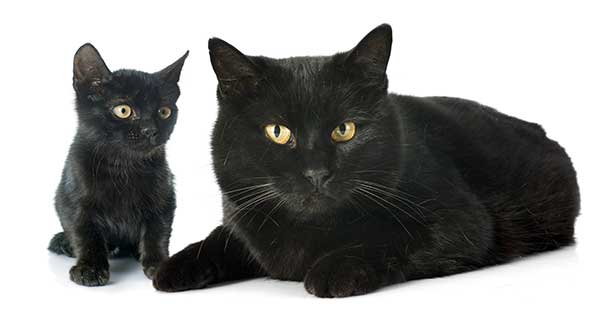
Conclusion
So, do cats mourn the death of their kittens? Yes, cats mourn the loss of their kittens, and they do it in different ways.
As a loving and responsible cat owner, you should understand that grief is a trying time for your mother cat. Supply her with all her needs by addressing any of the above mentioned signs of grief. That will go a long way in alleviating her sadness and escalating her recovery process.
Checkout Our Favorite Cat Products
1. Best Online Course For Cat Parents
Our favorite: The Cat Language Bible (How to Finally Undrestand And Speak to Your Cat) – A new form of cat to human communication that many cat owners have dreamed about… but few have actually thought possible.
2. Best Vacuum to Tackle Pet Hair
Our favorite: Dyson Ball Animal 2 – Engineered for homes with pets. With features and tools that dig out dirt, hair and allergens everywhere your pet gets.
3. Best Immune Support For Cats
Our favorite: Tomlyn Immune Support – Best Supplement for Cats and Kittens.

